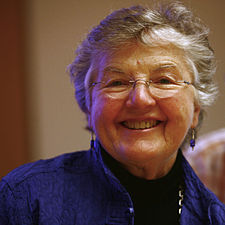
Ms. Allen is an expert in the field of optimizing compilers. As a pioneer in compiler organization and optimization algorithms, she has made seminal contribution to the science. Her work on inter procedural analysis and automatic parallelization continue to be on the leading edge of compiler research. She has successfully reduced this science to practice through the transfer of this technology to products such as the STRETCH HARVEST Compiler, the COBOL Compiler, and the Parallel FORTRAN Product.
In the past 40 years of computing, computers have shrunk, networks have expanded and new languages have emerged – and Fran Allen has watched it all firsthand. Forty years ago, Allen was a math teacher looking to pay off college debt with a job at IBM; today, she is part of "one of the most amazing periods in computing ever." Following completion of her master's degree in Math at the University of Michigan in 1957, Allen joined the IBM Research division to teach FORTRAN to other researchers. "At the time, FORTRAN was revolutionary and a very exciting breakthrough in computing," she says. Today, she is amazed at how far computer languages have come. "Java is fascinating; it's a paradigm that matches the new network computing opportunities." Since the early 1960s, Allen, a scientist at IBM's T. J. Watson Research Center in Hawthorne, New York, has focused her attention on compilers and high-performance computing systems. Her pioneering compiler work culminated in algorithms and technologies that are the basis for the theory of program optimization today and are widely used throughout the industry. She is now launching a study on compilers with new systems and problems and exploring their uses. According to Allen, "The convergence of computing, communications, and digitization of information is letting us create new solutions in new ways. Computer languages and their compilers are a key to making this work."
Allen was not the first woman at IBM Research; in fact, she was one of many. "Later, as computing emerged as a specialized field, employers began to require engineering credentials, which traditionally attracted few women. But the pendulum is swinging back as women enter the field from other areas such as medical informatics, user interfaces and computers in education."
When she's not exploring new computing opportunities, Allen's passions are climbing mountains and studying environmental issues. She's a member of the American Alpine Club and the Alpine Club of Canada, participating in exploratory expeditions to the Artic and on the Chinese/Tibet border.
Born | Aug 4, 1932 |
Education | University of Michigan |
Awards | Turing Awards |